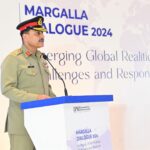By Agha Iqrar Haroon

Civilian and Military leaderships of Pakistan are firm today that Pakistan shall not allowed anybody to fight Afghan War in Pakistani soil or bring Afghan War into Pakistan.
No doubt that Pakistan has paid enormously for what Pakistan opted in late 70s by bringing Afghan War into Pakistan along with (the then three million) Afghans (those now are over 10 million) who never opted to return to their land of destruction—Afghanistan.
The Past
Peshawar had been a base-camp for US-sponsored Afghan-Russo War also known as “Operation Cyclone” for planning, providing logistics and execution for so-called Afghan Jihad.
The practice of offering Pakistan as base-camp for any US-sponsored war in the region continued even in 21 century and Pakistan offered its land for the success of “Operation Enduring Freedom” (code name for US attack on Afghanistan after 9/11 tragedy).
Interestingly, Pakistan offered its land to United States in 1979 for Operation Cyclone when there was military rule in the country. Situation was similar in 2001 when Pakistan offered its fly zones, land routes and seaports to United States for Operation Enduring Freedom.
Strangely, military rules were clamped in Pakistan two years before this region experienced US adventures. Ziaul Haq threw elected government of late Prime Minister Bhutto in 1977 and United States came to invade Afghanistan through Afghan Jihad in 1979. Gen Musharraf sent former Prime Minister Nawaz Sharif home in 1999 and US came to re-invade Afghanistan in 2001 through slogan of “War on Terror”.
Saying that we (Pakistan) are not ready for fighting Afghan War in Pakistani soil is a real “Paradigm Shift” in Pakistan Foreign Policy. This indicates that Pakistan is no more interested to keep Afghanistan as its constant burden while this is loud and clear message to United States that Pakistan may not be available for any US adventurism in the region in future. Pertinent to mention here that US adventurism against Iran cannot be ruled out in near future.
This fact is not debatable that Pakistan housed the then Mujahideen (who are called now Terrorists) under the directions of United States and with the financial support from Saudi Arabia from 1979 to 1999.
Certain reports of Politburo of former Soviet Union contradict popular claim of Pakistan that it started providing support to Mujahideen in early 80s. It may be mentioned that official record of former Soviet Union (Politburo reports) claims that Pakistan and Iran started injecting logistic, financial and weaponry support to Mujahideen through Herat and Helmand provinces well before Nur Mohammad Taraki was installed in Afghanistan by former USSR in 1979. Tentative time for crafting Mujahideen should be considered as March 1978 instead of early 80s as claimed by western countries.
Allowing Pakistani soil to foreigners for fighting two Afghan wars (Afghan-Russo War and US-led war against Taliban) from 1978 to 2006 brought disasters after disasters to Pakistan including weaponisation and radicalisation of society after 1979 Jihad and the formation of Tehrik-i-Taliban Pakistan (TTP) after supporting War on Terror. There is no doubt left that TTP was formed with conceptual support (Narrative = Religion+Fight against State etc), funding and logistics support from Indian intelligence agency RAW. Analysts believe that RAW followed the same design what Pakistan developed for forming Mujahideen in 1978. Design was simple—-injection of narrative that fight for installing Islamic state is Jihad and a regular army can be defeated with subversive activities. It is believed that Pakistan launched 4th Generation Warfare against Soviet-sponsored Afghan government in 1978-79 and RAW did the same against Pakistan in year 2006 by forming TTP. Today, Pakistan is blamed by US President Trump to support Haqqani network in Afghanistan although Haqqanis put their seal in favour of TTP Chief (Amir) Mullah Fazulhullah who is at war with State of Pakistan while living in Kunar province of Afghanistan. Haqqanis could support Commander Sajna against Mullah Fazlullah for the slot of TTP Amir if they were friends of Pakistan. It may be remembered that Commander Sajna was ready for dialogue with State of Pakistan while Fazullah announced his will to destroy Pakistan. Haqqanis never objected formation of TTP. It sounds ridiculous that Pakistan is supporting Haqqanis who are reportedly in good relations with TTP leadership living in Afghanistan while Mullah Fazullah is “Most Wanted man” in Pakistan.
The Present
Minister for Foreign Affairs Khawaja Muhammad Asif on Thursday (September 7, 2017) while briefing journalists said that Pakistan will bring new paradigm to its Foreign Policy.
Asif while giving briefing on Pakistan’s Foreign Policy at the end of three-day Envoys’ Conference in Islamabad was of the view that Pakistan was not terminating its relations with the United States but it wanted ties with the US based on mutual respect.
He believes that United States should have respected Pakistan’s sovereignty and integrity (reference statement of US President Trump accusing Pakistan for housing terrorists including Haqqani group —– formally called as Mujahideen and Soldiers of God by US administration). Foreign Minister said formulation of a new Foreign policy was inevitable after Trump’s Pak-Afghan policy.
Foreign Minister indicated that he would travel to Iran soon for his meetings with Iranian President Hassan Rouhani and Iranian Foreign Minister Muhammad Javad Zarif. He already left for China for his important meetings with Chinese friends.
What Next?
Sino-Pak relations are time-tested and are irritating India and United States since China announced One Belt One Road (OBOR) futuristic international order. Pakistan being the flagship country of OBOR (by having China Pakistan Economic Corridor) has been under target by India. The newly formed Strategic Partnership between India and United States directs to making India as the regional leader for neutralizing China and capping its financial initiatives in the region. This situation brackets Pakistan with China and India with United States.
Pakistan still wishes to enjoy workable diplomatic relations with United States while staying out from its orbit. This is not the only thing Pakistan wishes. It also wishes to maintain and retain its Middle Eastern Foreign Policy that revolves around its relations with Saudi Arabia. It is believed that China has no objection for such diplomatic design of Pakistan but it would be difficult for Pakistan balance between Iran and Saudi Arabia. Iran is providing energy to CPEC heart—Gwadar Port while China wishes to neutralize Iran-India relations by offering a good share to Iran out of OBOR.
Another possible issue for Pakistan is designing its relationship with Russia. Kremlin wishes strategic relations (if not strategic partnership) with Pakistan but Russia-Pak relations are still on bumpy road. Pakistan’s foreign policy towards Mid East contradicts with Russian interests in Middle East while the sole Russian project in Pakistan is yet to be kicked off due to alleged US intervention. Pakistan and Russia signed South-North Pipeline project to bring LPG gas from Karachi to Lahore but this project has been in trouble since many years.
Russia also offered Pakistan to invest in Iran-Pakistan Pipeline project but this project is also in trouble since a decade due to alleged US and Saudi pressures on Islamabad. Meanwhile, Pakistan opted US-backed Turkmenistan -Afghanistan—Pakistan—India (TAPI) Gas Pipeline.
Regarding diplomatic relations with central Asian countries, this can be called a moderate success story. Tajikistan is directly engaged with Pakistan through US-Sponsored CASA-1000 project and Turkmenistan is involved due to TAPI. Alas both projects go through troubled Afghanistan and their successful implementation is still a big question. Kazakhstan and Uzbekistan have no direct financial interests with Pakistan but both countries welcomed Pakistan into Shanghai Cooperation Organisation (SCO) bloc. They maintain balance relations with India and Pakistan though they had over 70 year old social and cultural relations with India being former SSRs of former Soviet Union.
Turkey is emerging power of Asia Minor linking Middle East with South Asia and the Europe. United States allegedly tried to destabilise Turkey last year through a failed coup. Turkey had been trying balancing its relations with Russia, United States and Saudi Arabia over Syrian conflict but Qatar crises played pivotal role to place Turkey as competitor of Saudi Arabia in Middle East. Turkey has direct investments in Pakistan and stands with Pakistan whenever its support is needed including over Kashmir issue.
Pakistan having archrival India at its eastern border and untrustworthy neighbouring Afghanistan at its western border is being pressed hard by United States and the only exit-point from such pressures is northern neighbour and time-tested China. Analysts believe that China is also in favour of good US-Pak relations and Pakistan will try to better its relations with President Trump by using Saudi influence in Washington.
Analysts believe that it is too early to determine that Pakistan really wishes Paradigm shift in its Foreign Policy. There is no doubt that Pakistan wishes to revisit and redesign its policy towards Afghanistan.
Analysts are of the view that time, strength, strong commitment and an independent economic policy is needed for Pakistan to leaving US relations behind. If Pakistan reviews and change it US policy then it has to work for balancing its Middle Eastern policy to please Iran and Russia.
This writer believes that today there are no Grey Areas left in South Asian diplomatic scene and two superpowers are present along with their strategic partners—US with India and Pakistan with China.
Is Pakistan actually prepare to go through drastic diplomatic changes and announces that Islamabad stands only with China? –Let the future answer this question.
Disclaimer:
The views and opinions expressed in this article/Opinion/Comment are those of the author and do not necessarily reflect the official policy or position of the Dispatch News Desk (DND). Assumptions made within the analysis are not reflective of the position of Dispatch News Desk.





